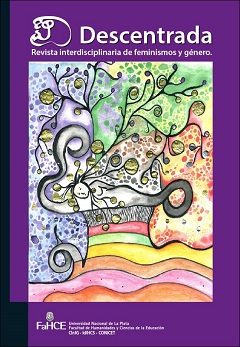The FDIM and women's rights in Latin America: expectations and alliances during the Cold War, 1950-1970
Main Article Content
Abstract
The Women’s International Democratic Federation was founded in Paris in 1945 with the aim of defending peace and rights of women and children. Frequently, theFederation was often addressed as a “communist front”. With the help of the documents from the archive in Moscow (GARF) this article shows that the participation of women and organizations from the Latin American countries in the WIDF depended on different factors including the dynamics of the Cold War, their political orientation and their position with respect to the Soviet Union and its foreign policy. But it shows that the female activists from Latin America did not agree with all the political decisions of the pro-Soviet leadership of the WIDF and demanded changes in different aspects of the organization of work in the Federation.
Downloads
Article Details

This work is licensed under a Creative Commons Attribution-NonCommercial-ShareAlike 4.0 International License.
This work is licensed under a Creative Commons Attribution 4.0 International (https://creativecommons.org/licenses/by-nc-sa/4.0/deed.es).
References
Armstrong, E. (2016). Before Bandung: The Anti-imperialist Women’s Movement in Asia and the Women’s International Democratic Federation. Signs, 41(2), 305-331.
Autio-Sarasmo, S. & K. Miklossy (eds.) (2011). Reassessing Cold War Europe. London: Routledge.
Chase, M. (2015). Revolution Within the Revolution. Women and Gender Politics in Cuba, 1952-1962. Chapel Hill: The University of North Carolina Press.
Concheiro, E., Modonesi, M. y Gutiérrez Crespo, H. (2007). El comunismo: otras miradas desde América Latina. México: UNAM.
de Haan, F. (2012). The Women's International Democratic Federation (WIDF): History, Main Agenda and Contributions (1945-1991). En Th. Dublin and K. Sklar (eds.). Women and Social Movements (WASI) Online Archive, Recuperado de http://alexanderstreet.com/products/women-and-social-movements-international
De Haan, F. (2017). La Federación Democrática Internacional de Mujeres (FDIM) y America Latina, de 1945 a los años setenta. En A. M. Valobra & M. Yusta (eds.). Queridas Camaradas. Historias iberoamericanas de mujeres comunistas (pp.17-44). Buenos Aires: Miño y Davila.
De Haan, F. (2018). The Global Left-Feminist 1960s. From Copenhagen to Moscow and New York. En Ch. Jian, M. Klimke, M. Kirasirova, M. Nolan, M. Young and J. Waley-Cohen (Eds.), The Routledge Handbook of the Global Sixties (pp. 230-242). London: Routledge.
Donert, C. (2014). Whose Utopia? Gender, Ideology and Human Rights at the 1975 World Congress in East Berlin. En J. Eckel & S. Moyn The Breakthrough: Human Rights in the 1970s (pp.68-87). Philadelphia: University of Pennsylvania Press.
Edelman, F. (1996). Banderas, Pasiones, Camaradas. Buenos Aires: Dirple.
Gradskova, Y. (2014). The Soviet Union: 'Chile is in Our Hearts.' Practices of Solidarity between Propaganda, Curiosity and Subversion. En K. Christiaens, I. Goddeeris, M. Rodríguez (Eds.), European Solidarity with Chile (pp. 329-346) Frankfurt am Main: Peter Lang.
Gradskova, Y. (2019). Women’s International Democratic Federation, the ‘Third World’ and the Global Cold War from the late-1950s to the mid-1960s. Women’s History Review, 29(2), 270-288.
Hajimu, M. (2015). Cold War Crucible. Cambridge Ma.: Harvard University Press.
Ilic, M. (2011). Soviet Women, Cultural Exchange and the Women’s international Democratic Federation. En S. Autio-Sarasmo, & K. Miklossy (eds.), Reassessing Cold War Europe (pp.157-174). London: Routledge.
Kanet, R. (1988). Soviet Propaganda and the process of national liberation. In R. Kanet Soviet Union, Eastern Europe and the Third World (pp.84-114). Cambridge: Cambridge University Press.
McGregor, K. (2013). The Cold War, Indonesian Women and the Global Anti-Imperialist Movement, 1946-1965. En J. Pieper-Mooney & F. Lanza (Eds.). De-centering Cold War History. Local and Global Change (pp.31-51). London & New York: Routledge.
McGregor, K. (2016). Opposing Colonialism: the Women's International Democratic Federation and decolonisation struggles in Vietnam and Algeria 1945–1965. Women’s History Review, 25(6), 925-944.
Molyneux, M. & N. Craske (2002). Gender and the Politics of Rights and Democracy in Latin America. Basingstoke: Palgrave.
Pieper Mooney, J. (2013a). Fighting Fascism and Forging New Political Activism: The Women’s International Democratic Federation in the Cold War. En J. Pieper-Mooney & F. Lanza (Eds.). De-centering Cold War History (pp. 52-73) London: Routledge.
Pieper Mooney, J. (2013b). El antifascismo como fuerza movilizadora: Fanny Edelman y la Federación Democrática Internacional de las Mujeres (FDIM). Anuario IEHS, 28.
Stoler, A. L. (2009). Along the Archival Grain: Epistemic Anxieties and Colonial Common Sense. Princeton: Princeton University Press.
Tonchu, E. (2004). Rossiia – zhenskaiasudba. St-Petersburg: Tonchu.
Valobra, A. (2014). “Mujeres-sombra” y “Barbudas”: Género y política en el Primer Congreso Latinoamericano de Mujeres, Chile- 1959. Anuario del Instituto de Historia Argentina, 14. En Memoria Académica. Recuperado de: http://www.memoria.fahce.unlp.edu.ar/art_revistas/pr.6729/pr.6729.pdf
Valobra, A. M. & M. Yusta (eds.) (2017). Queridas Camaradas. Historias iberoamericanas de mujeres comunistas. Buenos Aires: Miño y Dávila.
Westad, O.A. (2005). The Global Cold War. Third World Interventions and the Making of our Time. Cambridge: Cambridge University Press.
